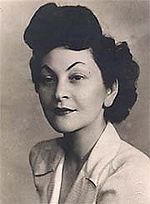- Doria Shafik
-
Doria Shafiq
Arabic: درية شفيق
Born 1908
Tanta, EgyptDied 1975
CairoOccupation author, feminist, revolutionary, women's rights activist Doria Shafiq (1908 – 1975) (Arabic: درية شفيق) was one of the women who led the women's liberation movement in Egypt in the early 1950s.[1] As a result of her activities, Egyptian women now have the right to elect and nominate in the Egyptian constitution. She founded literature patrols, and served as a freedom fighter against the British occupation in Egypt.
She was born in Tanta, in the Nile delta and studied in the French mission school. She was among the first female students sent by the Egyptian Ministry of Education to study at Sorbonne University in Paris at the government's expense. She also studied for a PhD in philosophy at the Sorbonne; her thesis subject was woman in Islam in which she argued that Islam allows equality for women.
On her return from France accompanied by her husband, the dean of the faculty of arts in Cairo University rejected hiring her in the university because "she is a woman". Princess Shuvekar (the first wife of King Fuad I of Egypt), offered her the position of chief manager of the new women's magazine. It was the first magazine, written in Arabic and directed to teach and educate the Egyptian woman. It was founded in the late 1940s, in order to write about topics regarding liberation of Egyptian women.[2]
She founded a movement to eradicate ignorance and illiteracy among girls and women in many populated regions in Cairo and founded a school in Boulaq for the same purpose.
Contents
Storming Parliament
In February 1951, she led a demonstration, accompanied by 1500 Egyptian women, during which she broke into the Egyptian Chamber and spoke to the council to consider the issues and demands of Egyptian women. After a week, the Council granted Egyptian women the right to vote and stand for parliament.
Struggle against occupation
In 1951, she prepared a paramilitary Task of Egyptian women to resist the British army units in the Suez Canal, indicating a willingness to fight and send trained nurses to the field. She also led a demonstration for women, in which she surrounded the British Barclays Bank in Cairo in January 1951 and called for a Boycott.
Bent Nile Party
After the Egyptian Revolution of 1952, she asked the government to transform "the daughter of the Nile union" into the first women's party of Egypt.
Strike and isolation
Because of the changing political situation in the country after the revolution, and the absence of genuine political activity, in 1957 Doria Shafiq was put under house arrest after a hunger strike against General Abdel Nasser. She remained in seclusion about 18 years. [3]
Versions translation and literary work
She issued several periodicals, including The New Woman magazine and "daughter of the Nile" and the small chick magazine for children. During her years of house arrest, Shafiq translated the Koran into English and French, and wrote several poetry books in addition to her own memoirs.
After her house arrest in 1957, Nasser had Shafiq's name barred from all Egyptian texts, periodicals, and books. Today, there is very little written about her and it is difficult to find her original texts.
Seclusion and death
Shafiq was placed under house arrest in 1957 by Nasser. In 1975 she committed suicide by throwing herself off the balcony of her home.
Books about Doria Shafiq
"Various woman" by Cynthia Nelson (research study in 1940's)[4][5]
References
- ^ "A Diwan of contemporary life". Al-Ahram Weekly. 2001-06-06. http://weekly.ahram.org.eg/2001/536/chrncls.htm. Retrieved 2008-08-12.
- ^ "Speaking for the other half". Al-Ahram Weekly. 2001-03-07. http://weekly.ahram.org.eg/2001/523/sc3.htm. Retrieved 2008-08-12.
- ^ "Speaking for the other half". gwsafrica.org. Archived from the original on 2008-04-23. http://web.archive.org/web/20080423034458/http://www.gwsafrica.org/teaching/bio+links.html. Retrieved 2008-08-12.
- ^ http://www.upf.com/book.asp?id=NELSOF96
- ^ http://www.amazon.com/Doria-Shafik-Egyptian-Feminist-Woman/dp/9774244133
Categories:- 1908 births
- 1975 deaths
- University of Paris alumni
- Egyptian women's rights activists
- Egyptian women writers
- Feminist writers
- Egyptian Muslims
- Islamic feminists
- Egyptian revolutionaries
Wikimedia Foundation. 2010.
